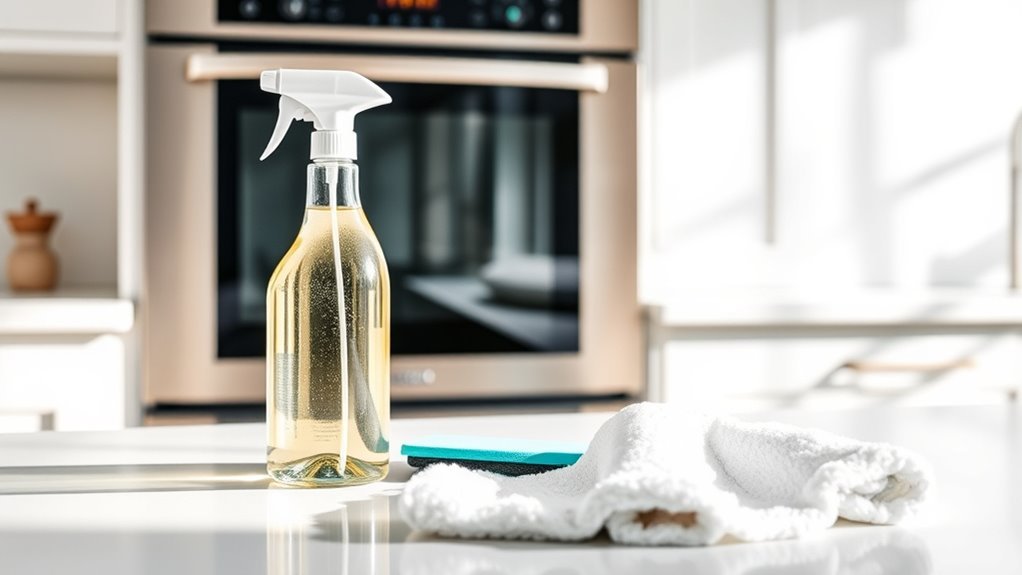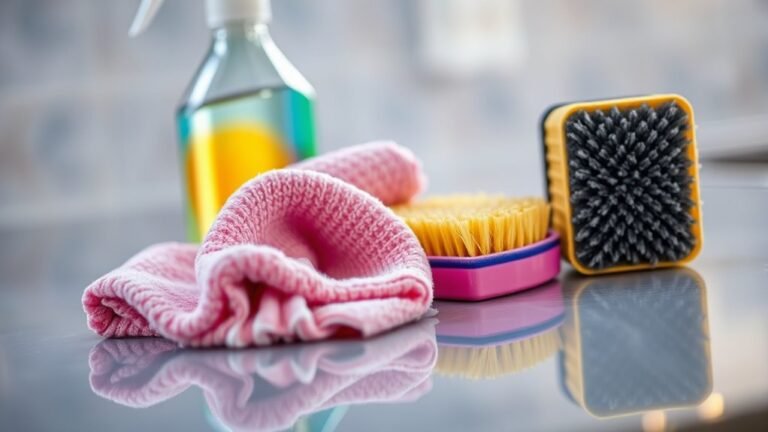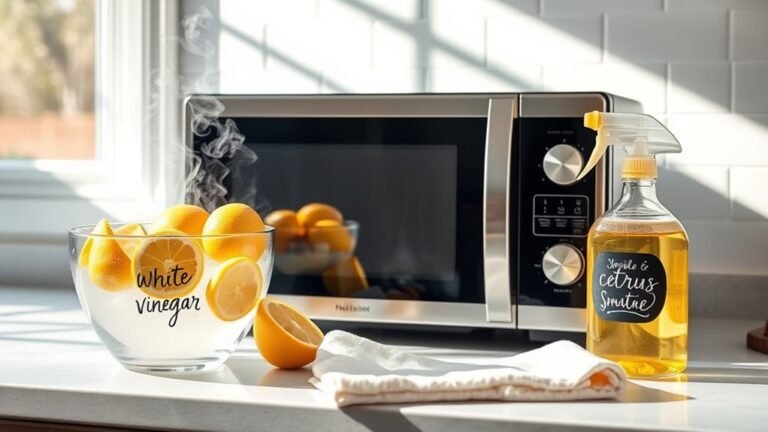Best Products to Clean Your Oven
If you’re tackling tough grease and baked-on food, heavy-duty and gel-based oven cleaners offer powerful, precise solutions to cut through grime quickly. For safer, eco-friendly choices, natural options like vinegar, baking soda, and lemon gently dissolve residue without harsh chemicals. Fast-acting sprays speed up cleaning, while oven wipes keep things fresh between deep cleans. Whether you prefer DIY methods or professional-grade products, there are effective options to suit your needs—explore how each works best for a spotless oven.
Heavy-Duty Oven Cleaners for Tough Stains
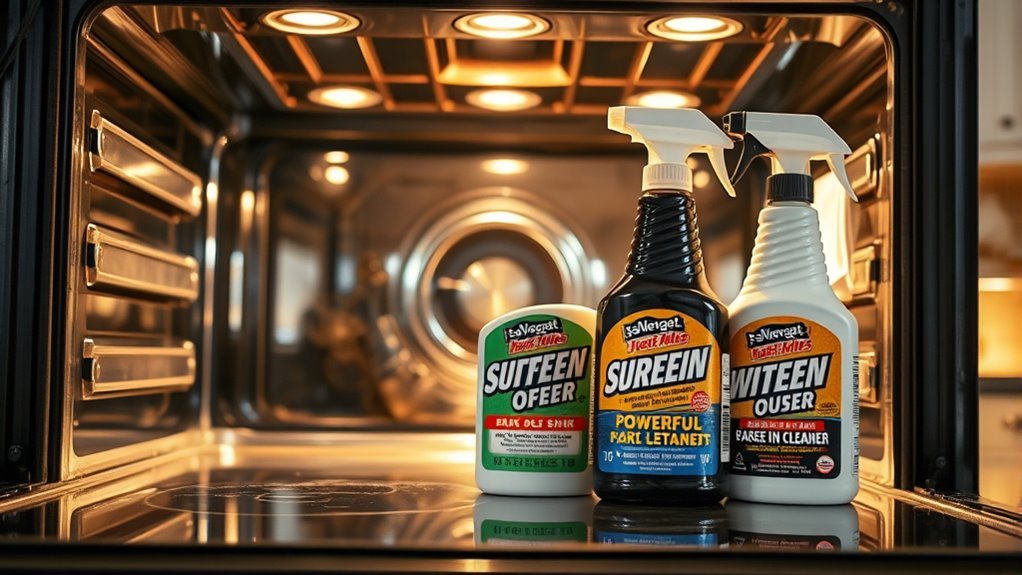
When grease and baked-on food refuse to budge, heavy-duty oven cleaners are your best bet for restoring a spotless interior. You’ll want to select products with heavy duty formulas specifically designed to tackle stubborn grime without excessive scrubbing. These cleaners often contain powerful agents that break down carbonized food and grease layers, saving you time and effort. When using them, make sure to follow safety instructions closely—ventilate the area well and wear gloves to protect your skin. Apply the cleaner evenly, let it sit for the recommended time, then wipe away softened residues with a damp cloth or sponge. With the right heavy-duty formula, you’ll regain control over your oven’s cleanliness, enjoying a fresh, ready-to-use cooking space without hassle or compromise.
Natural and Eco-Friendly Oven Cleaning Solutions
If you want to skip harsh chemicals, vinegar and baking soda create a powerful, natural oven cleaner that tackles grease and grime effectively. You can also use a lemon and salt scrub to break down stains while leaving a fresh scent behind. Both methods are eco-friendly and easy to prepare with common household ingredients.
Vinegar and Baking Soda
Two common household ingredients, vinegar and baking soda, make a powerful and natural combination for cleaning your oven without harsh chemicals. You’ll appreciate the vinegar benefits: it cuts through grease and grime while deodorizing. Start by sprinkling baking soda over the oven’s interior surfaces. The baking soda reactions begin when you spray vinegar on top, causing a fizzing action that loosens baked-on residue. Let it sit for 15–20 minutes to maximize effectiveness. Then, use a damp cloth or sponge to wipe away the loosened debris. This method not only spares you from toxic fumes but also gives you control over cleaning intensity. It’s a practical, eco-friendly approach that fits perfectly with your desire for freedom from harsh chemicals and complicated products.
Lemon and Salt Scrub
A lemon and salt scrub offers a straightforward, natural way to tackle stubborn oven grime. You’ll appreciate the lemon benefits—its natural acidity helps break down grease and burnt-on food without harsh chemicals. The salt properties provide gentle abrasion, scrubbing away residue without scratching your oven surfaces. To use, cut a lemon in half, dip the cut side into coarse salt, and scrub the affected areas. Let it sit for 10-15 minutes to loosen grime, then wipe clean with a damp cloth. This method not only cleans effectively but also leaves a fresh scent, making your oven feel renewed. If you want an eco-friendly, cost-effective solution that gives you freedom from toxic cleaners, this lemon and salt scrub is a practical choice.
Oven Cleaning Sprays With Fast-Acting Formulas
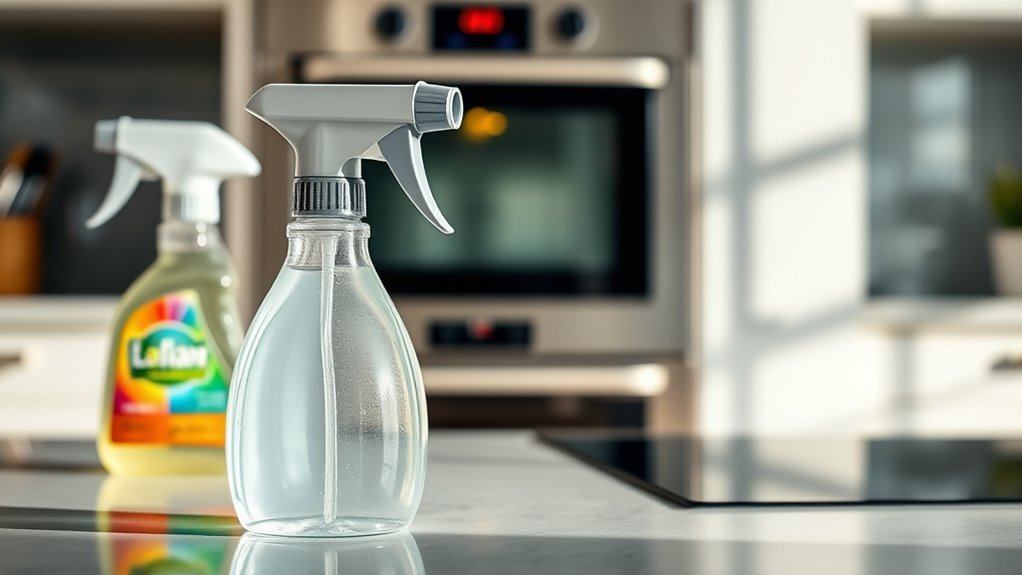
Several oven cleaning sprays boast fast-acting formulas designed to tackle stubborn grease and baked-on residue quickly, saving you time and effort. When choosing a spray, consider its oven spray effectiveness—look for products with powerful degreasers and enzymes that break down grime in minutes. These fast cleaning techniques let you avoid lengthy scrubbing sessions, giving you more freedom from chore time. To use, apply the spray evenly, let it sit for the recommended time (often 10–15 minutes), then wipe away with a damp cloth or sponge. Always follow safety instructions and ventilate your kitchen well. With these sprays, you get a practical, time-saving solution that keeps your oven spotless without hassle, making oven maintenance easier and letting you focus on what matters most.
Gel-Based Oven Cleaners for Targeted Application
Gel-based oven cleaners offer precise control for tackling tough spots and baked-on grease without the mess of sprays. When you use gel application techniques, you can apply the cleaner exactly where it’s needed, avoiding unnecessary coverage on oven surfaces that don’t require attention. This targeted cleaning benefits you by reducing waste and minimizing exposure to harsh chemicals. The thick consistency clings to vertical surfaces, ensuring the cleaner stays put and works effectively over time. You’ll find gel cleaners especially useful for stubborn burnt-on residues in hard-to-reach corners. Just apply a generous layer, let it sit as directed, then wipe away grime with ease. This method gives you freedom to clean efficiently and thoroughly, focusing effort only where it counts.
Oven Cleaning Foams for Deep Penetration

When using oven cleaning foams, it’s important to take into account the foam activation time, as this affects how well the product penetrates tough grime. You’ll want a foam that expands quickly and clings to surfaces for maximum cleaning power efficiency. Choosing the right formula guarantees deep, thorough grease removal with minimal scrubbing.
Foam Activation Time
The amount of time you let oven cleaning foam activate directly affects how well it breaks down tough grease and burnt-on residue. Foam duration is essential; too short, and the foam effectiveness drops, too long, and you might waste time. Typically, a 10-15 minute activation allows deep penetration into grime for ideal results.
| Foam Duration | Recommended Time | Result |
|---|---|---|
| Short | 5-7 minutes | Limited grease removal |
| Moderate | 10-15 minutes | Ideal foam effectiveness |
| Extended | 20+ minutes | Possible surface drying |
To enjoy freedom from scrubbing, follow the recommended foam duration. This balance guarantees the foam works hard so you don’t have to.
Cleaning Power Efficiency
Although many oven cleaning foams claim to tackle tough grime, their true effectiveness depends on cleaning power efficiency—how well the formula penetrates stubborn grease and burnt-on residue. When choosing a product, consider how deep the foam can reach into crevices and baked-on messes. Higher cleaning power efficiency means less scrubbing and faster results, which is essential if you want to reduce your cleaning frequency. A foam that breaks down layers of grime effectively not only saves time but also prolongs your oven’s lifespan by preventing buildup. Keep in mind, product effectiveness varies widely, so read labels and reviews to find foams designed for deep penetration. This guarantees you’re investing in a cleaner that truly liberates you from tough oven messes without constant reapplication.
Non-Toxic Oven Cleaners Safe for Families
Since you’ll likely be spending time in the kitchen with your family, choosing a non-toxic oven cleaner is vital to keep the environment safe and healthy. Opting for family friendly alternatives guarantees you avoid harsh chemicals that can linger and affect indoor air quality. Many non-toxic options use plant based ingredients that effectively break down grease without compromising safety. When selecting your cleaner, look for:
- Natural enzymes or citrus extracts that cut through grime
- Biodegradable formulas free from ammonia and bleach
- Products labeled hypoallergenic or free from synthetic fragrances
These choices help maintain a clean oven while preserving your family’s well-being. Using plant based, non-toxic cleaners gives you peace of mind and the freedom to cook in a fresh, chemical-free kitchen environment.
Multi-Purpose Kitchen Cleaners Suitable for Ovens
Many multi-purpose kitchen cleaners offer a practical solution when you want to tackle your oven without juggling multiple products. These multi surface cleaners are designed to cut through grease and baked-on grime, making them suitable for oven interiors. When selecting one, look for formulas that specify oven use to guarantee effectiveness and avoid damage. If you’re mindful of your environmental impact, eco friendly options are widely available and just as efficient. These products often use biodegradable ingredients and avoid harsh chemicals, giving you a safer cleaning routine. Just spray, let it sit according to instructions, then wipe clean. Using a multi-purpose cleaner saves time and storage space, freeing you from clutter while keeping your oven spotless and ready for your next culinary adventure.
DIY Oven Cleaning Products With Common Household Items
Three common household items—baking soda, vinegar, and lemon juice—can be combined to create effective DIY oven cleaners. You’ll appreciate how these natural ingredients tackle grease and burnt residue without harsh chemicals. Start by sprinkling baking soda over the oven’s interior surfaces, then spray a vinegar mixture to activate fizzing that loosens grime. After it sits for 15-20 minutes, wipe the area clean with a damp cloth. For stubborn stains, lemon juice adds a fresh, natural boost that cuts through grease while leaving a pleasant scent.
- Baking soda’s gentle abrasiveness scrubs away buildup without scratching
- Vinegar mixture’s acidity breaks down tough grease and loosens residue
- Lemon juice naturally deodorizes and enhances cleaning power
Using these items gives you freedom from expensive cleaners and toxic fumes.
Oven Cleaning Wipes for Quick Touch-Ups
If you’re looking for a faster way to tackle minor oven messes, oven cleaning wipes offer a convenient alternative to homemade solutions. These pre-moistened wipes are designed for quick cleaning hacks, letting you easily wipe away grease and spills without scrubbing or rinsing. They’re perfect for oven maintenance tips focused on keeping your appliance spotless between deep cleans. Just grab a wipe, target the spots, and toss it after use—no mess, no hassle. Oven cleaning wipes save time and effort, making them ideal if you want to maintain a clean oven with minimal interruption to your day. Keep a pack handy to stay on top of small spills and splatters, ensuring your oven stays fresh and ready whenever you need it.
Professional-Grade Oven Cleaning Powders and Pastes
Professional-grade oven cleaning powders and pastes deliver powerful results for tackling tough, baked-on grease and grime that everyday wipes can’t handle. When you want to free yourself from stubborn residues, these products use professional cleaning techniques designed for deep penetration and easy removal.
Professional oven cleaning powders and pastes penetrate deeply to remove stubborn baked-on grease and grime effectively.
To get the best outcome, focus on effective application methods:
- Apply paste evenly over the oven’s interior surfaces, avoiding vents.
- Let the powder sit for 15-30 minutes to break down grime.
- Scrub with a non-abrasive brush or sponge to lift residue without scratching.
Frequently Asked Questions
How Often Should I Clean My Oven for Best Results?
You should aim for a cleaning frequency of every 3 to 6 months, depending on how often you use your oven. Regular maintenance tips include wiping spills right away and doing a quick clean after heavy cooking sessions. This approach prevents buildup and keeps your oven running efficiently. Sticking to this routine means you won’t need harsh scrubbing later, giving you more freedom to enjoy cooking without stressing about tough messes.
Can Oven Cleaning Products Damage Oven Surfaces?
Cleaning your oven is like walking a tightrope — one wrong step, and you could damage oven surface materials. Some harsh chemicals in cleaning products might cause chemical reactions that dull finishes or corrode surfaces, especially on self-cleaning ovens or those with special coatings. To keep your freedom from worry, always check product labels and test on a small area first. Opt for gentle, oven-safe cleaners to protect your oven while keeping it spotless.
What Safety Precautions Are Needed During Oven Cleaning?
When cleaning your oven, always prioritize gloves usage to protect your skin from harsh chemicals. Don’t skip proper ventilation—open windows or turn on fans to keep fumes from building up, ensuring you breathe easily. Avoid mixing cleaning agents, and follow product instructions carefully. These precautions help you clean safely and maintain freedom from irritation or accidents, making the process smoother and more effective.
How Do I Remove Strong Chemical Odors After Cleaning?
After cleaning, you’ll want to tackle strong chemical odors promptly. First, guarantee excellent ventilation by opening windows and turning on exhaust fans to circulate fresh air. You can also place odor neutralizers, like activated charcoal or baking soda bowls, near the oven to absorb lingering smells. If possible, run the oven at a low temperature for 15–20 minutes with the door slightly open to help dissipate fumes, giving you a fresher, freer kitchen environment.
Are There Any Oven Cleaner Options Safe for Self-Cleaning Ovens?
Imagine your oven’s interior glowing gently after a self-cleaning cycle. For self-cleaning ovens, harsh chemical oven cleaners can damage the special lining. Instead, consider self-cleaning alternatives like natural cleaners—baking soda and vinegar work wonders. You can create a paste, apply it, and let it sit to break down grime without chemicals. This practical, gentle approach safeguards your oven while giving you freedom from toxic fumes and harsh residues.
